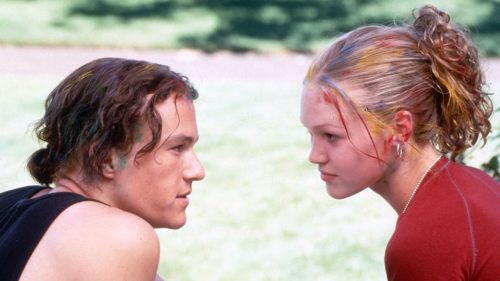Classic Lit And Teen Flicks: Why It Works
Was Valley Girl the first teen adaptation of classic literature? I think it might have been. In 1983, Martha Coolidge loosely retold the story of forbidden love between two people from different worlds - Randy (Nicolas Cage), a city punk, and Julie (Deborah Foreman), the valley girl - and in so doing brought a young, modern version of Shakespeare's Romeo and Juliet to the screen. Two years later, Lisa Gottlieb's Just One of the Guys took a gender-bending spin on Shakespeare's Twelfth Night, which was again given the teen treatment with Amanda Bynes and Channing Tatum in 2006's She's The Man.
Since Valley Girl and Just One of the Guys broke ground with teen-friendly Shakespeare twists, all of classic lit was opened for a high school retelling. Arguably the best of these mashups is Clueless, of course, Amy Heckerling's near-perfect 1995 adaptation of Jane Austen's Emma. The polite, politic world of Emma Woodhouse is so easily reimagined as a tony Beverly Hills high school, with dozens of clever references to Austen's wonderful novel embedded in a story that's a delight on its own, even for those viewers who aren't Austen obsessives. In 2010, Will Gluck's Easy A took a more overtly meta twist on Nathaniel Hawthorne's The Scarlet Letter, with the kids in Olive (Emma Stone)'s class assigned to read the book even as they act it out in their personal lives.
In 1996, Baz Luhrmann went back to the Shakespeare well with Romeo + Juliet, making the unconventional decision to use Shakespeare's very words in a modern, teenage setting. Shakespeare continues to be the most popular source for these films, with Tommy O'Haver's Get Over It, a very relaxed update to A Midsummer Night's Dream, O, from Tim Blake Nelson, which takes Othello and sets it around a high school basketball court, and the 2013 Jonathan Levine film Warm Bodies, which adds zombies as well as teenagers to Romeo and Juliet.
And in 1999, we were treated to three such films. Roger Kumble's Cruel Intentions takes on Pierre Choderlos de Laclos' French epistolary novel Les Liaisons dangereuses, and Gil Junger's 10 Things I Hate About You makes yet another teen Shakespeare adaptation, this time of The Taming of the Shrew. (Oddly, Nelson's O was also supposed to be released that year but was shelved, after Columbine, until 2001; if it had been released on its intended date, Julia Stiles would have starred in two teen tellings of Shakespeare in 1999.) Many makeover stories have their roots in George Bernard Shaw's Pygmalion, but Robert Iscove's She's All That is the first to make our Henry Higgins (Freddie Prinze Jr.) and Eliza Doolittle (Rachael Leigh Cook) teens, those most likely to undergo vigorous making-over at the drop of a hat.
Here's the thing about all of these movies: for the most part, they work, and those that don't (Get Over It and, to a lesser extent, O) aren't unsuccessful because of the now tried-and-true approach of giving an adolescent update to classic literature, but because of other failures that undermine the story. So why is it that adapting classic lit into teen flicks is such an auspicious endeavor?
Well, firstly, it depends on the literature. It's unlikely that Dostoevsky, for instance, would benefit from a juvenile interpretation. Teenagers are not existentialists. No, the classic titles best updated to high school are either comedies of manners, like Emma and Twelfth Night, or romantic tragedies, like The Scarlet Letter and Romeo and Juliet. Think of it - what is high school but a random lottery of comedy and tragedy, romance and drama? You're up or you're down in high school, and either way, you're feeling it deeply.
Teens, more than any other demographic of modern, Western society, are still prey to a caste system. How many of these movies begin with the narrator (or a chatty friend of the protagonist, who is new to school) pointing out the different segments of high school society, often in a lunchroom or courtyard: the stoners, the Plastics, the jocks, the geeks. They group together in impermeable little clusters, unwelcoming to anyone who doesn't speak the secret language. The haves and have-nots of Austen's society are nowhere else so clearly delineated as they are in today's high schools. You're either a woman of means or you're screwed. It's as true of teens as it is of the landed gentry of 19th century England.
And the villains of classic lit are of the sort that would be hard to swallow in many other scenarios. A scoundrel taking advantage of a lady's virtue just because he can, evil aristocratic women hellbent on ruining the lives of lesser mortals - these are our jocks and our mean girls, and nowhere else, except perhaps Wall Street, could their limitless power and wickedness feel so relevant as on a high school campus.
It's exhausting, the needlessly complicated machinations and melodrama of these fictional aristocrats - who has time to live like that when you have a job? Only teens can devote their lives to finding a mate and ruining their foes. Teens spend so much time in school, this self-contained little society where they see each other every day and have nothing very much to occupy themselves but gossip and judgment and matchmaking, and it's the same with the aristocracy, who are up to their elbows in land but have no real occupation. Everything, everything in these books revolves around finding a mate, with a romantic urgency and practicality that only a girl without a date three weeks before prom can truly understand.
And speaking of prom: the elegant balls of society, the impassioned focus on what to wear, that's all high school. These ritualistic events meant to pair off singles don't really exist in modern, adult life, but for teens, their entire season revolves around them: homecoming and prom and winter formal. It's a big deal. Like reputations are a big deal in a way that couldn't possibly sustain itself into adulthood. Who's slept with whom, who's dated whom - high school is a place where shaming a woman for losing her virtue is still very much a thing. It's a place where a girl can still be "ruined," the way silly Lydia Bennet was almost ruined if not for Mr. Darcy's chivalry.
1999 represents the peak year for high school adaptations of classic novels - Cruel Intentions, She's All That and 10 Things I Hate About You are three of the best of these titles - but it's still something of an untapped market, even today. How many of our most time-honored novels have yet to be adapted into a teen comedy or drama, books that would be perfect for such treatment? The Brontës have been shockingly under-represented in this genre, and an adolescent version of Daphne du Maurier's Rebecca would be nothing short of amazing. Dickens, Fitzgerald, Anna Karenina and Tess of the d'Urbervilles - these are all ripe for teen makeovers, like poor Tai and her farmer's clothes.
Of course there's another discussion to be had about whether these adaptations encourage kids to read or otherwise, but I can only speak for myself: I discovered Jane Austen because of Clueless, and I will be eternally in debt to Clueless for that gift.



